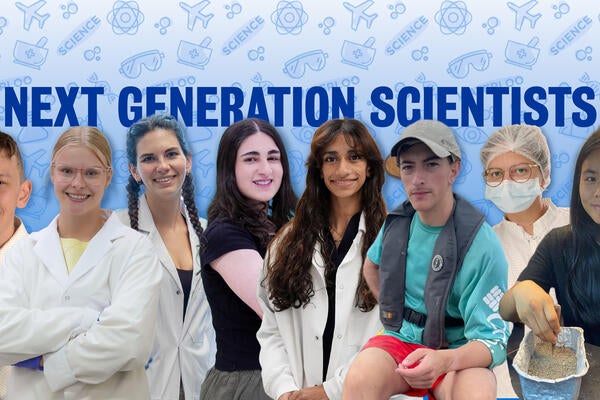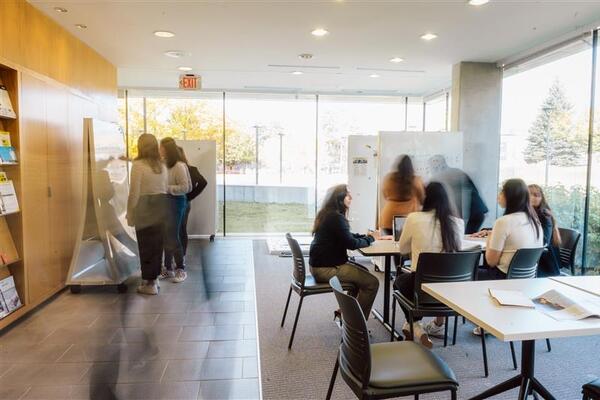
Training the next generation of scientists
New funding from the Faculty of Science help undergraduate students participate in cutting-edge research on campus

New funding from the Faculty of Science help undergraduate students participate in cutting-edge research on campus
By Sarah Fullerton Faculty of ScienceThe University of Waterloo is at the forefront of developing future-focused solutions by investing in experiential education and boundary-breaking research to lead innovation for real-world impact.
This summer, the Faculty of Science allocated more than $260,000 in new funding to support undergraduate research assistantships. This investment provides Science students with invaluable hands-on experience, enabling them to work closely with renowned researchers at Waterloo.
Waterloo’s research is dedicated to addressing the most complex challenges through applied research excellence. Through this initiative, undergraduate research assistants are gaining critical experience that tackle global issues. These range from investigating the role of mRNA processing in cell fate, tissue development, and disease, advancing our understanding of greenhouse gas emissions from restored wetlands, exploring innovative strategies to combat antibiotic resistance, and uncovering the processes behind planet formation and evolution. As an added benefit, students that work in research positions during their undergraduate degree are one step closer to earning an IDEAL Scholar medallion at graduation for fulfilling the Discovery category of the award.
“Participating in research equips students with the essential tools and critical thinking skills needed to excel after graduation,” says Chris Houser, dean of the Faculty of Science. “Science’s undergraduate research assistants will graduate with sought-after experience that will make them competitive candidates for graduate school or careers in their field.”
Learn how Science students are making a difference in research labs in our four departments.

Lindsey Shivers is a fourth-year Honours Biochemistry student.
Lindsey Shivers, a President’s Scholarship recipient, is combatting antibiotic resistance by researching a complex cyclic peptide antibiotic called LL-A0341Beta1. She aims to accomplish the first chemical synthesis of this molecule, establish its molecular target in the cell membrane of bacteria, and determine how it exerts in antibacterial effects.
Read more about Shivers’s undergraduate research experience.

Mackenzie Jeffery James Sluys (BSc '24) is an Earth Sciences alumni.
Mackenzie Jeffrey James Sluys is measuring and quantifying the methane released from eight restored wetlands across southern Ontario to help model future emissions in similar environments.
Read more about Sluys’s undergraduate research experience.

Haavia Rajakumar is a third-year and Jessica Lin is a fourth-year both in the Honours Science program.
Jessica Lin and Haavia Rajakumar are working as lab assistants gaining essential skills and researching RNA-binding proteins to explore the role of ESRP1 in cancer cell lines.
Both Lin and Haavia are President’s Scholarship recipients. Read more about their undergraduate research experience.

Pluto Jiang is a fourth-year Physics and Astronomy student with a minor in computing
Pluto Jiang, a President’s Scholarship recipient, is exploring how planets form, by implementing a planetesimal code into an existing class of functions called DiscEvolution. This research aims to help improve the understanding of how planets evolve.
Read more about Jiang’s undergraduate research experience.

Read more
Science students take learning beyond the classroom to drive real-world change

Read more
True North Fund partners with Waterloo to develop a Canadian talent pipeline to help strengthen the country’s top 100 tech firms

Read more
Co.Lab co-founders draw on their co-op experiences to build a Forbes recognized global business
The University of Waterloo acknowledges that much of our work takes place on the traditional territory of the Neutral, Anishinaabeg, and Haudenosaunee peoples. Our main campus is situated on the Haldimand Tract, the land granted to the Six Nations that includes six miles on each side of the Grand River. Our active work toward reconciliation takes place across our campuses through research, learning, teaching, and community building, and is co-ordinated within the Office of Indigenous Relations.